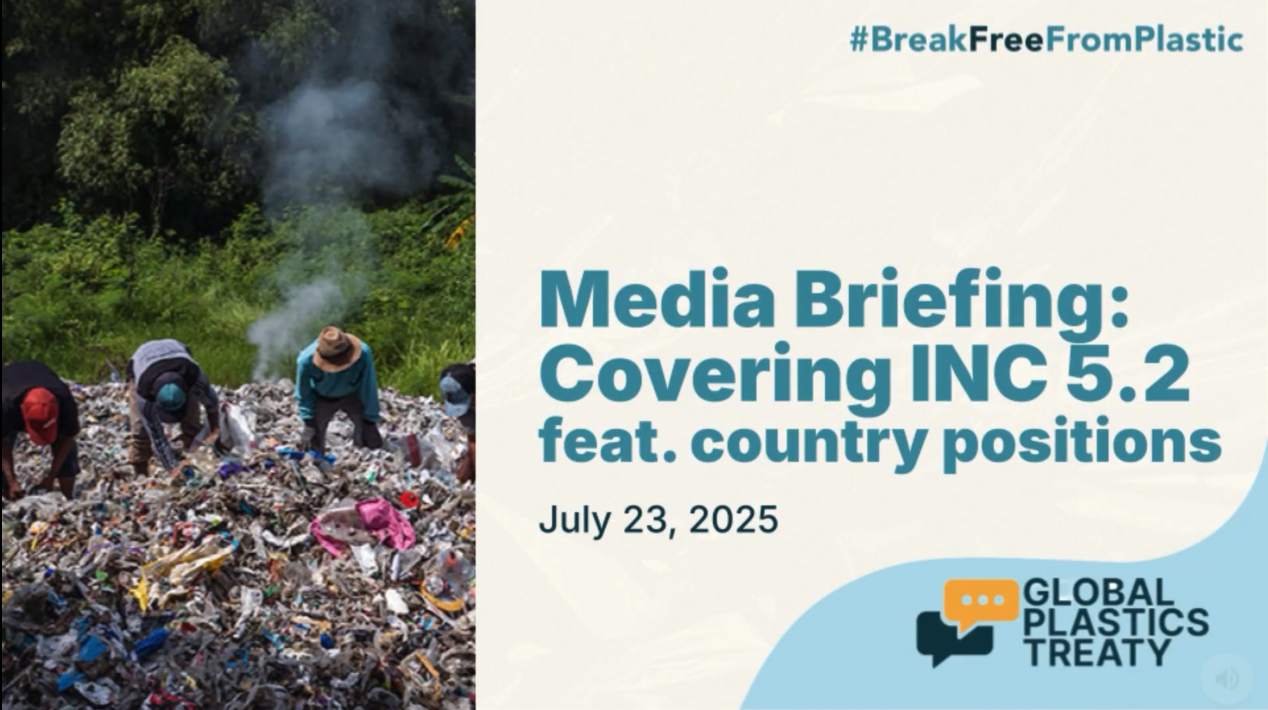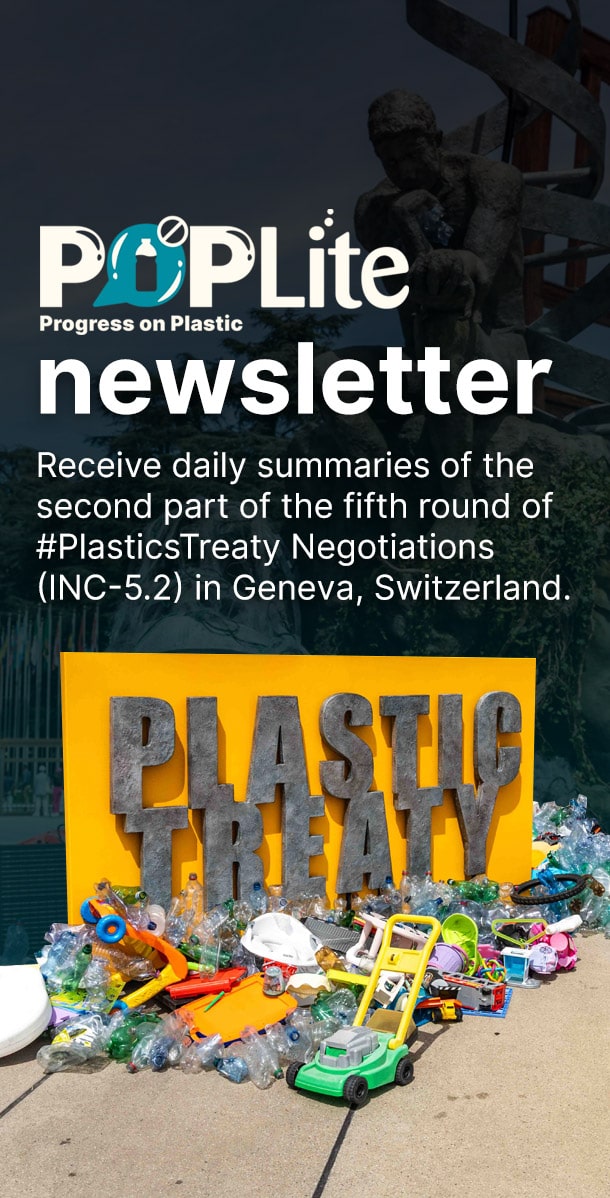On July 23, 2025, the #BreakFreeFromPlastic movement hosted a comprehensive media briefing to provide journalists with essential context ahead of the INC 5.2 negotiations for the Global Plastic Treaty.
The online briefing featured regional policy experts who discussed country positions and negotiation dynamics of the Asia Pacific region, to help media personnel prepare for INC 5.2 coverage, and better understand how countries frame their priorities around economic development, environmental protection, and regional and international cooperation.
Asia Pacific countries sit at the epicentre of both plastic production and pollution impacts; the region's diverse economies and environmental challenges make it a key battleground in the global treaty negotiations. The negotiation outcomes will determine global standards for plastic production, waste management, and industry accountability.
The briefing also identified key challenges, including procedural issues affecting civil society access, potential delaying tactics, watered-down commitments favouring waste management over production caps, and industry influence promoting circular economy narratives over substantive pollution reduction. For a more nuanced coverage of the treaty, the policy experts and researchers on the panel urged journalists to consider a human rights-centric, fossil-fuel-free development model for the Asia Pacific.
KEY TAKEAWAYS
- Critical threats that could significantly weaken the treaty include chemical and plastic-producing countries challenging the treaty's scope to address the full plastics lifecycle, potentially removing obligations for primary plastic polymer production reduction and chemicals of concern from the final agreement.
- The most significant risk is that negotiations could result in a framework convention with voluntary measures rather than legally binding obligations, which would fundamentally undermine the treaty's ability to address global plastic pollution at the required scale and speed.
- A critical political obstacle to a strong, effective treaty is the decision-making process, which relies on a consensual decision-making process where all countries are not equal, instead of an equal, voting process.
- With pressure to reach a consensus, countries may compromise on stronger provisions to secure a deal, with critical decisions on production reduction measures deferred to future COP processes.
- As diverse as the Asia Pacific region is, we are most impacted by plastic pollution, and often bear disproportionate blame. We can look to strong examples like the GRULAC and African regions, to present a more united front in the upcoming negotiations.
UN member-states are set to reconvene in Geneva, Switzerland on August 5-14, 2025 for the resumed fifth session of the Intergovernmental Negotiating Committee (INC 5.2) for an international legally binding agreement to end plastic pollution.
KEY QUOTES
Semee Rhee, Global Policy Advisor, Break Free From Plastic
“It's not about whether or not we will have a treaty. It's about how many countries will be courageous enough to say that we can no longer continue producing the amount of plastics we currently produce for the sake of the environment and human well-being.”
Siddharth Ghanshyam Singh, Centre for Science & Environment (CSE)
“The moment to push for ambition is now. Opportunities like this don’t come often, and countries must remember who they are negotiating for; their people and our shared planet. We cannot allow a few vocal opponents to derail and delay progress. It’s time to stand firm and take a decisive step toward ending plastic pollution.”
Pinky Chandran, Asia Pacific Coordinator, Break Free From Plastic
“The plastic problem often resembles a kaleidoscope, with no single perspective illuminating the complete picture; in fact, each turn reveals a new representation. We must view the plastic problem as a tapestry, where every element is interconnected, interlinked, and interdependent. A fragmented, piecemeal approach simply won't suffice. And so there must be global binding measures to reduce plastic production, in order to tackle the plastic pollution problem, through a just transition lens”.
Siddika Sultana, Executive Director, Environment and Social Development Organization (ESDO)
"South Asia is both a significant hotspot for plastic pollution and a center of innovation. To address this issue effectively, the region must shift from isolated national initiatives to coordinated regional action. A united approach—supported by enforcement, investment, and inclusivity—can establish South Asia as a leader in developing an effective global treaty on plastic waste."
Punyathorn Jeungsmarn, Plastics Campaign Researcher, Environmental Justice Foundation
“As a region, Southeast Asia is particularly affected by plastic pollution, and is increasingly becoming the dumping ground for plastic waste, misguided false solutions such as waste-to-energy technologies, and petrochemical expansion. It is therefore crucial for our representatives to stand up and put people and the planet over plastics and the petrochemical industry. Throughout the past rounds of negotiations, we have seen courageous stances from Southeast Asian countries. We hope to see those again in Geneva.”
Additional Resources:
- [Recording] Media Briefing
- CSE’s Country Position Papers - This document compiles all the in-session submissions of member states from the fifth round of negotiations. In the report, we've categorised member states into groups based on the level of ambition indicated in their in-session submissions. It covers 22 articles from the Preamble to Article 20. We believe this report will provide both observers and member state delegations with a comprehensive overview of the 22 articles we've analysed.
- Global Press Kit - an essential journalist’s guide on how to cover INC 5.2.
- POPLite Newsletter - sign up to receive a daily summary of the negotiations in your inbox as soon as they begin in August.
- [Asia Pacific] Spokesperson List - diversify the voices you feature by roping in regional policy experts, researchers, and impacted frontline communities.
- [Talking Points] Right to Development - a vision for a fossil-fuel-free, holistic development model, co-authored by civil society organisations, Indigenous Peoples and NGOs.
- [Film Screening + Panel Discussion] Homo Plasticus - for those attending INC 5.2 in Geneva, join us for a thought-provoking screening of "Homo Plasticus - Plastic Inside Us" at Pathé Balexert.
Note: High-resolution images of spokespeople and additional background materials are available upon request. Interview opportunities with regional experts can be arranged following the briefing.
Press Contacts:
- Devayani Khare: devayani@breakfreefromplastic.org
- Eah Antonio: eah@breakfreefromplastic.org
About Break Free From Plastic – #BreakFreeFromPlastic is a global movement envisioning a future free from plastic pollution. Since its launch in 2016, more than 3,500 organizations representing millions of individual supporters around the world, have joined the movement to demand massive reductions in single-use plastics and push for lasting solutions to the plastic pollution crisis. BFFP member organizations and individuals share the values of environmental protection and social justice, and work together through a holistic approach to bring about systemic change. This means tackling plastic pollution across the whole plastics value chain—from extraction to disposal—focusing on prevention rather than cure and providing effective solutions. www.breakfreefromplastic.org




